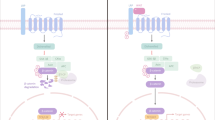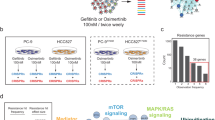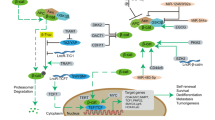Abstract
Transforming growth factor beta 1 (TGF-β1) is a potent tumor suppressor but, paradoxically, TGF-β1 enhances tumor growth and metastasis in the late stages of cancer progression. This study investigated the role of TGF-β type I receptor, ALK5, and three mitogen-activated protein kinases (MAPKs) in metastasis by breast cancer cell line MDA-MB-231. We show that autocrine TGF-β signaling in MDA-MB-231 cells is required for tumor cell invasion and tumor angiogenesis. Expression of kinase-inactive ALK5 reduces tumor invasion and formation of new blood vessels within the tumor orthotopic xenografts in severe combined immunodeficiency (SCID) mice. In contrast, constitutively active ALK5-T204D enhances tumor invasion and angiogenesis by stimulating expression of matrix metalloproteinase MMP-9/gelatinase-B. Ablation of MMP-9 in ALK5-T204D cells by RNA interference (RNAi) reduces tumor invasion and tumor growth. Importantly, RNAi-MMP-9 reduces tumor neovasculature and increases tumor cell death. Induction of MMP-9 by TGF-β-ALK5 signaling requires MEK-ERK but not JNK, p38 MAPK or Smad4. Dominant-negative MEK blocks and constitutively active MEK1 enhances MMP-9 expression. However, all three MAPK cascades (ERK, JNK and p38 MAPK) are required for TGF-β-mediated cell migration. Collectively, our results show that TGF-β-ALK5-MAPK signaling in tumor cells promotes tumor angiogenesis and MMP-9 is an important component of this program.
This is a preview of subscription content, access via your institution
Access options
Subscribe to this journal
Receive 50 print issues and online access
$259.00 per year
only $5.18 per issue
Buy this article
- Purchase on Springer Link
- Instant access to full article PDF
Prices may be subject to local taxes which are calculated during checkout









Similar content being viewed by others
Abbreviations
- MAPK:
-
mitogen-activated protein kinase
- MMP-9:
-
matrix metalloproteinase-9
- TGF-β:
-
transforming growth factor beta
References
Adachi-Yamada T, Nakamura M, Irie K, Tomoyasu Y, Sano Y, Mori E et al. (1999). p38 Mapk can be involved in TGF beta superfamily signal transduction in Drosophila wing morphogenesis. Mol Cell Biol 19: 2322–2329.
Aguirre-Ghiso JA, Estrada Y, Liu D, Ossowski L . (2003). ERKMAPK Activity as a determinant of tumor growth and dormancy; regulation by p38SAPK. Cancer Res 63: 1684–1695.
Attisano L, Carcamo J, Ventura F, Weis FM, Massague J, Wrana JL . (1993). Identification of human activin and TGF beta type I receptors that form heteromeric kinase complexes with type II receptors. Cell 75: 671–680.
Bakin AV, Rinehart C, Tomlinson AK, Arteaga CL . (2002). p38 mitogen-activated protein kinase is required for TGF{beta}-mediated fibroblastic transdifferentiation and cell migration. J Cell Sci 115: 3193–3206.
Bakin AV, Safina A, Rinehart C, Daroqui C, Darbary H, Helfman DM . (2004). A critical role of tropomyosins in TGF-{beta} regulation of the actin cytoskeleton and cell motility in epithelial cells. Mol Biol Cell 15: 4682–4694.
Bakin AV, Tomlinson AK, Bhowmick NA, Moses HL, Arteaga CL . (2000). Phosphatidylinositol 3-kinase function is required for TGFbeta-mediated epithelial to mesenchymal transition and cell migration. J Biol Chem 275: 36803–36810.
Barcellos-Hoff MH, Ewan KB . (2000). Transforming growth factor-beta and breast cancer: mammary gland development. Breast Cancer Res 2: 92–99.
Benckert C, Jonas S, Cramer T, von Marschall Z, Schafer G, Peters M et al. (2003). Transforming growth factor {beta}1 stimulates vascular endothelial growth factor gene transcription in human cholangiocellular carcinoma cells. Cancer Res 63: 1083–1092.
Bergers G, Brekken R, McMahon G, Vu TH, Itoh T, Tamaki K et al. (2000). Matrix metalloproteinase-9 triggers the angiogenic switch during carcinogenesis. Nat Cell Biol 2: 737–744.
Bertolino P, Deckers M, Lebrin F, ten Dijke P . (2005). Transforming growth factor-{beta} signal transduction in angiogenesis and vascular disorders. Chest 128: 585S–5590.
Beyaert R, Cuenda A, Vanden Berghe W, Plaisance S, Lee JC, Haegeman G et al. (1996). The p38/RK Mapk pathway regulates interleukin-6 synthesis response to tumor necrosis factor. Embo J 15: 1914–1923.
Bhattacharya A, Toth K, Mazurchuk R, Spernyak JA, Slocum HK, Pendyala L et al. (2004). Lack of microvessels in well-differentiated regions of human head and neck squamous cell carcinoma A253 associated with functional magnetic resonance imaging detectable hypoxia, limited drug delivery, and resistance to irinotecan therapy 10.1158/1078-0432.CCR-04-1306. Clin Cancer Res 10: 8005–8017.
Bhowmick NA, Ghiassi M, Bakin AV, Aakre M, Lundquist CA, Engel M et al. (2001a). TGFb mediates epithelial to mesenchymal transdifferentiation through a RhoA-dependent mechanism. Mol Biol Cell 12: 27–36.
Bhowmick NA, Zent R, Ghiassi M, McDonnell M, Moses HL . (2001b). Integrin beta 1 signaling is necessary for transforming growth factor-beta activation of p38MAPK and epithelial plasticity. J Biol Chem 276: 46707–46713.
Chantrain CF, Shimada H, Jodele S, Groshen S, Ye W, Shalinsky DR et al. (2004). Stromal matrix metalloproteinase-9 regulates the vascular architecture in neuroblastoma by promoting pericyte recruitment. Cancer Res 64: 1675–1686.
Dennler S, Itoh S, Vivien D, ten Dijke P, Huet S, Gauthier JM . (1998). Direct binding of Smad3 and Smad4 to critical TGF beta-inducible elements in the promoter of human plasminogen activator inhibitor-type 1 gene. EMBO J 17: 3091–3100.
Derynck R, Zhang YE . (2003). Smad-dependent and Smad-independent pathways in TGF-beta family signalling. Nature 425: 577–584.
Dickson MC, Martin JS, Cousins FM, Kulkarni AB, Karlsson S, Akhurst RJ . (1995). Defective haematopoiesis and vasculogenesis in transforming growth factor-beta 1 knock out mice. Development 121: 1845–1854.
Dumont N, Arteaga CL . (2000). Transforming growth factor-beta and breast cancer: Tumor promoting effects of transforming growth factor-beta. Breast Cancer Res 2: 125–132.
Dumont N, Arteaga CL . (2003). A kinase-inactive type II TGFbeta receptor impairs BMP signaling in human breast cancer cells. Biochem Biophys Res Commun 301: 108–112.
Dumont N, Bakin AV, Arteaga CL . (2003). Autocrine transforming growth factor-beta signaling mediates Smad-independent motility in human cancer cells. J Biol Chem 278: 3275–3285.
Edlund S, Landstrom M, Heldin CH, Aspenstrom P . (2002). Transforming growth factor-beta-induced mobilization of actin cytoskeleton requires signaling by small GTPases Cdc42 and RhoA. Mol Biol Cell 13: 902–914.
Engel ME, McDonnell MA, Law BK, Moses HL . (1999). Interdependent SMAD and JNK signaling in TGF-beta-mediated transcription. J Biol Chem 274: 37413–37420.
Eyers PA, Craxton M, Morrice N, Cohen P, Goedert M . (1998). Conversion of SB 203580-insensitive MAP kinase family members to drug-sensitive forms by a single amino-acid substitution. Chem Biol 5: 321–328.
Farina AR, Coppa A, Tiberio A, Tacconelli A, Turco A, Colletta G et al. (1998). Transforming growth factor-beta1 enhances the invasiveness of human MDA-MB-231 breast cancer cells by up-regulating urokinase activity. Int J Cancer 75: 721–730.
Folkman J . (1971). Tumor angiogenesis: therapeutic implications. N Engl J Med 285: 1182–1186.
Frey RS, Mulder KM . (1997). Involvement of ERK 2 and stress-activated protein kinase/JNK activation by TGF-beta in the negative growth control of breast cancer cells. Cancer Res 57: 628–633.
Friedl P, Wolf K . (2003). Tumour-cell invasion and migration: diversity and escape mechanisms. Nat Rev Cancer 3: 362–374.
Hanahan D, Weinberg RA . (2000). The hallmarks of cancer. Cell 100: 57–70.
Hartsough MT, Mulder KM . (1995). Transforming growth factor beta activation of p44[IMAGE] in proliferating cultures of epithelial cells. J Biol Chem 270: 7117–7124.
Hedges JC, Dechert MA, Yamboliev IA, Martin JL, Hickey E, Weber LA et al. (1999). A role for p38(MAPK)/HSP27 pathway in smooth muscle cell migration. J Biol Chem 274: 24211–24219.
Heissig B, Hattori K, Dias S, Friedrich M, Ferris B, Hackett NR et al. (2002). Recruitment of stem and progenitor cells from the bone marrow niche requires MMP-9 mediated release of kit-ligand. Cell 109: 625–637.
Huang C, Jacobson K, Schaller MD . (2004). MAP kinases and cell migration. J Cell Sci 117: 4619–4628.
Huang S, New L, Pan Z, Han J, Nemerow GR . (2000). Urokinase plasminogen activator/urokinase-specific surface receptor expression and matrix invasion by breast cancer cells requires constitutive p38α mitogen-activated protein kinase activity. J Biol Chem 275: 12266–12272.
Huot J, Houle F, Rousseau S, Deschesnes RG, Shah GM, Landry J . (1998). SAPK2/p38-dependent F-actin reorganization regulates early membrane blebbing during stress-induced apoptosis. J Cell Biol 143: 1361–1373.
Jain RK . (2003). Molecular regulation of vessel maturation. Nat Med 9: 685–693.
Janji B, Melchior C, Gouon V, Vallar L, Kieffer N . (1999). Autocrine TGF-beta-regulated expression of adhesion receptors and integrin-linked kinase in HT-144 melanoma cells correlates with their metastatic phenotype. Int J Cancer 83: 255–262.
Jodele S, Chantrain CF, Blavier L, Lutzko C, Crooks GM, Shimada H et al. (2005). The contribution of bone marrow-derived cells to the tumor vasculature in neuroblastoma is matrix metalloproteinase-9 dependent. Cancer Res 65: 3200–3208.
Johansson N, Ala-aho R, Uitto V, Grenman R, Fusenig NE, Lopez-Otin C et al. (2000). Expression of collagenase-3 (MMP-13) and collagenase-1 (MMP-1) by transformed keratinocytes is dependent on the activity of p38 mitogen-activated protein kinase. J Cell Sci 113: 227–235.
Larsson J, Goumans MJ, Sjostrand LJ, van Rooijen MA, Ward D, Leveen P et al. (2001). Abnormal angiogenesis but intact hematopoietic potential in TGF-beta type I receptor-deficient mice. EMBO J 20: 1663–1673.
Leenen PJ, de Bruijn MF, Voerman JS, Campbell PA, van Ewijk W . (1994). Markers of mouse macrophage development detected by monoclonal antibodies. J Immunol Methods 174: 5–19.
Lewis CE, Pollard JW . (2006). Distinct role of macrophages in different tumor microenvironments. Cancer Res 66: 605–612.
Linder S, Aepfelbacher M . (2003). Podosomes: adhesion hot-spots of invasive cells. Trends Cell Biol 13: 376–385.
Massague J . (1998). TGF-beta signal transduction. Annu Rev Biochem 67: 753–791.
Mucsi I, Skorecki KL, Goldberg HJ . (1996). ERK and the small GTP-binding protein, Rac, contribute to the effects of TGF-beta1 on gene expression. J Biol Chem 271: 16567–16572.
Oshima M, Oshima H, Taketo MM . (1996). TGF-beta receptor type II deficiency results in defects of yolk sac hematopoiesis and vasculogenesis. Dev Biol 179: 297–302.
Pawlak G, Helfman DM . (2002). Post-transcriptional down-regulation of ROCKI/Rho-kinase through an MEK-dependent pathway leads to cytoskeleton disruption in Ras-transformed fibroblasts. Mol Biol Cell 13: 336–347.
Price JE, Polyzos A, Zhang RD, Daniels LM . (1990). Tumorigenicity and metastasis of human breast carcinoma cell lines in nude mice. Cancer Res 50: 717–721.
Raingeaud J, Whitmarsh AJ, Barrett T, Derijard B, Davis RJ . (1996). MKK3- and MKK6-regulated gene expression is mediated by the p38 mitogen-activated protein kinase signal transduction pathway. Mol Cell Biol 16: 1247–1255.
Roberts AB, Wakefield LM . (2003). The two faces of transforming growth factor {beta} in carcinogenesis. Proc Natl Acad Sci 100: 8621–8623.
Sahai E, Olson MF, Marshall CJ . (2001). Cross-talk between Ras and Rho signalling pathways in transformation favours proliferation and increased motility. EMBO J 20: 755–766.
Seals DF, Azucena J, Eduardo F, Pass I, Tesfay L, Gordon R et al. (2005). The adaptor protein Tks5/Fish is required for podosome formation and function, and for the protease-driven invasion of cancer cells. Cancer Cell 7: 155–165.
Shibuya H, Yamaguchi K, Shirakabe K, Tonegawa A, Gotoh Y, Ueno N et al. (1996). TAB1: an activator of the TAK1 MAPKKK in TGF-beta signal transduction. Science 272: 1179–1182.
Siegel PM, Massague J . (2003). Cytostatic and apoptotic actions of tgf-[beta] in homeostasis and cancer. Nat Rev Cancer 3: 807–820.
Suarez-Cuervo C, Merrell MA, Watson L, Harris KW, Rosenthal EL, Vaananen HK et al. (2004). Breast cancer cells with inhibition of p38α have decreased MMP-9 activity and exhibit decreased bone metastasis in mice. Clin Exp Metastasis 21: 525–533.
Tarin D, Price JE . (1981). Influence of microenvironment and vascular anatomy on ‘metastatic’ colonization potential of mammary tumors. Cancer Res 41: 3604–3609.
Tibbles LA, Ing YL, Kiefer F, Chan J, Iscove N, Woodgett JR et al. (1996). MLK-3 activates the SAPK/JNK and p38/RK pathways via SEK1 and MKK3/6. EMBO J 15: 7026–7035.
Van den Steen P, Dubois B, Nelissen I, Rudd P, Dwek R, Opdenakker G . (2002). Biochemistry and molecular biology of gelatinase B or matrix metalloproteinase-9 (MMP-9). Crit Rev Biochem Mol Biol 37: 375–536.
Weidner N, Semple J, Welch W, Folkman J . (1991). Tumor angiogenesis and metastasis--correlation in invasive breast carcinoma. N Engl J Med 324: 1–8.
Welch DR, Steeg PS, Rinker-Schaeffer CW . (2000). Molecular biology of breast metastasis: genetic regulation of human breast carcinoma metastasis. Breast Cancer Res 2: 408–416.
Wexler H . (1966). Accurate identification of experimental pulmonary metastases. J Natl Cancer Inst 36: 641–645.
Yamaguchi K, Shirakabe K, Shibuya H, Irie K, Oishi I, Ueno N et al. (1995). Identification of a member of the MAPKKK family as a potential mediator of TGF-beta signal transduction. Science 270: 2008–2011.
Yin JJ, Selander K, Chirgwin JM, Dallas M, Grubbs BG, Wieser R et al. (1999). TGF-beta signaling blockade inhibits PTHrP secretion by breast cancer cells and bone metastases development. J Clin Invest 103: 197–206.
Yu L, Hebert MC, Zhang YE . (2002). TGF-beta receptor-activated p38 MAP kinase mediates Smad-independent TGF-beta responses. EMBO J 21: 3749–3759.
Zhang W, Ran S, Sambade M, Huang X, Thorpe PE . (2002). A monoclonal antibody that blocks VEGF binding to VEGFR2 (KDR/Flk-1) inhibits vascular expression of Flk-1 and tumor growth in an orthotopic human breast cancer model. Angiogenesis 5: 35–44.
Acknowledgements
We thank J-M Gauthier, J Massague, A Bhattacharya, and J Bromberg for providing reagents; Heinz Baumann, Ivan Still, and Elizabeth Repasky for critical reading of the paper; Mary M Vaughan and Karoly Toth for assistance with the immunohistochemistry and histopathology; Patricia Masso-Welch and Ming-Qiang Ren for help in some animal experiments. This work was supported by PHS Grant R01 CA95263 and USAMRMC Grant DAMD17-02-01-0602 (to AVB) and in part by the Roswell Park Cancer Institute Cancer Center Support Grant CA 16056.
Author information
Authors and Affiliations
Corresponding author
Rights and permissions
About this article
Cite this article
Safina, A., Vandette, E. & Bakin, A. ALK5 promotes tumor angiogenesis by upregulating matrix metalloproteinase-9 in tumor cells. Oncogene 26, 2407–2422 (2007). https://doi.org/10.1038/sj.onc.1210046
Received:
Revised:
Accepted:
Published:
Issue Date:
DOI: https://doi.org/10.1038/sj.onc.1210046
Keywords
This article is cited by
-
Old plasma dilution reduces human biological age: a clinical study
GeroScience (2022)
-
Selective therapeutic strategy for p53-deficient cancer by targeting dysregulation in DNA repair
Communications Biology (2021)
-
Flavones hydroxylated at 5, 7, 3′ and 4′ ameliorate skin fibrosis via inhibiting activin receptor-like kinase 5 kinase activity
Cell Death & Disease (2019)
-
Collagen type II suppresses articular chondrocyte hypertrophy and osteoarthritis progression by promoting integrin β1−SMAD1 interaction
Bone Research (2019)
-
Inflammation in thoracic aortic aneurysms
Herz (2019)



